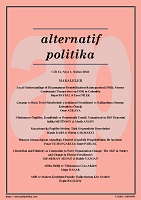CLIENTELISM AND ETHNICITY AS CONSTRAINTS TO PARTY ORGANIZATION CHANGE: THE AKP IN TURKEY AND CHANGE IN DISTRICT PRESIDENCIES
CLIENTELISM AND ETHNICITY AS CONSTRAINTS TO PARTY ORGANIZATION CHANGE: THE AKP IN TURKEY AND CHANGE IN DISTRICT PRESIDENCIES
Author(s): Gül Arıkan Akdağ, Halide YAZGANSubject(s): Government/Political systems, Political behavior, Politics and society, Social Theory, Inter-Ethnic Relations, Sociology of Politics, Politics and Identity
Published by: Rasim Özgür DÖNMEZ
Keywords: Political Parties; Party Organization; Clientelism; Ethnic Mobilization; the AKP;
Summary/Abstract: Based on the existing literature, the study tests the relevance of electoral and intra-party alliance concerns on party organization change for the AKP in its 2017 District Congress. We believe that both the electoral and intra-party alliance concerns the party faced in 2017, make it a suitable case to test the basic hypothesis of the study. The dataset used in the analysis consists of secondary data on 971 districts present in Turkey. District presidency change is employed as the key independent variable to estimate organization change. The result of the logistic regression indicates that the effect of increasing percentage of swing voters and members of the former alliance, despite being valid, have moderate positive effects on the AKP’s decision to change its organization. The insignificancy of the electoral safety of the party in the district reveals that in 2017 the AKP changed its organization regardless of the nature of the electoral competition it faces. Interestingly, results indicate that socioeconomic development and ethnic presence in districts are also significant factors that constrain organization change in the AKP. Based on these results we suggest that change in party organization becomes a more difficult issue in parties with strong clientelistic networks where political parties built electoral support through the conditional distribution of resources to voters. Similarly, ethnicity also acts as a constraint due to the peculiarity of the relations political parties develop with these groups. As such clientelism and ethnicity seem to have constraining effects on the abilities of parties to change their organizations. The results highlight the necessity of further research to generalize the validity of the effectiveness of clientelism and ethnic groups on political parties’ organization change on different settings.
Journal: Alternatif Politika
- Issue Year: 15/2023
- Issue No: 1
- Page Range: 141-166
- Page Count: 26
- Language: English

